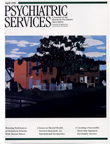Housing preferences and perceptions of health and functioning among homeless mentally ill persons
Abstract
OBJECTIVE. Most homeless persons who have received services for serious mental illness want to live on their own, but mental health professionals usually recommend group housing. This study examined the relationship between the types of residential arrangements preferred by homeless mentally ill persons and their demographic and clinical characteristics and perceptions of their health and functional status. METHODS. The study sample consisted of 118 homeless mentally ill persons living in publicly funded shelters in Boston who were enrolled in a research demonstration project that would provide them with housing. Before random assignment to housing, study participants were interviewed about their interest in moving, in staff support, and in living with others. Their clinical status and functional strengths and impairments were assessed using a variety of objective and subjective measures. RESULTS. Study participants reported a marked preference for independent living but expressed substantial interest in staff support. The desire for independent living was associated with a perceived ability to manage independent living, but was also associated with current substance abuse. Most indicators of clinical status and functional ability were not associated with housing preferences. CONCLUSIONS. Self-perceived functional ability may not be an influence on housing preferences, except when that ability is perceived as making independent living more difficult. Symptoms of mental illness did not appear to interfere with study participants' rational decision making about where to live. However, the study finding that substance abusers expressed a desire for independent living suggests the need for caution in adhering to homeless mentally ill persons' housing preferences, given the problems posed by substance abuse for their ability to maintain stable community housing.
Access content
To read the fulltext, please use one of the options below to sign in or purchase access.- Personal login
- Institutional Login
- Sign in via OpenAthens
- Register for access
-
Please login/register if you wish to pair your device and check access availability.
Not a subscriber?
PsychiatryOnline subscription options offer access to the DSM-5 library, books, journals, CME, and patient resources. This all-in-one virtual library provides psychiatrists and mental health professionals with key resources for diagnosis, treatment, research, and professional development.
Need more help? PsychiatryOnline Customer Service may be reached by emailing [email protected] or by calling 800-368-5777 (in the U.S.) or 703-907-7322 (outside the U.S.).



